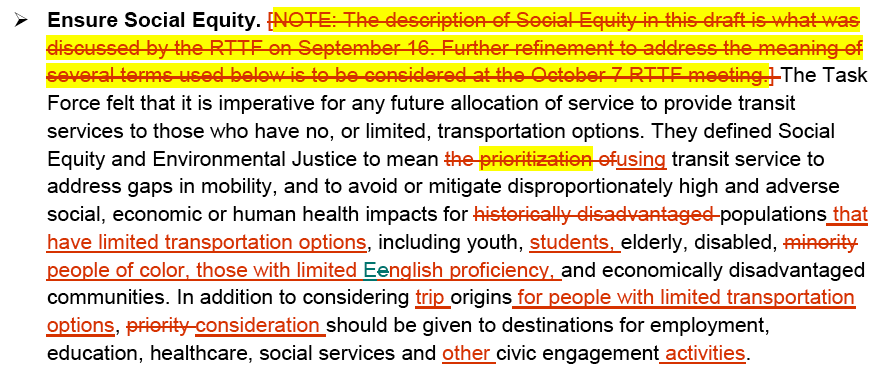A Tuesday ‘town hall’ will give King County Metro’s Regional Transit Task Force an opportunity to brief the public on seven recommendations the group has made on reinventing the way the agency plans its service and routes. It also presents an opportunity for you to come out and voice your support for a proposed plan that seems well aligned around the transportation needs of an urban city environment like Seattle’s core neighborhoods across Capitol Hill, First Hill and the Central District.
Tuesday, November 9
6:30-8:00 p.m.
Seattle University
Campion Ballroom
914 East Jefferson St.
We have reviewed a draft of the final recommendations from the task force and some of the edits and changes can be viewed in the embedded document below. The seven recommendations would create a Metro that would leave its old ways of planning behind and move the agency to a more data focused and analytical approach to transit route planning. It would also be a planning process conscious of what the task force calls ‘social equity’ — here’s the passage from the recommendation doc complete with revision markings:
Metro’s ‘old way’ is described by the task force thusly:
The current policy for transit service growth and reduction is based on three King County subareas (east, west and south) and was established in Metro’s 2002 – 2007 Six-Year Transit Development Plan. For service growth, every 200,000 hours of new transit service is to be allocated with 40 percent to the east subarea, 40 percent to the south, and 20 percent to the west. This is called the 40/40/20 policy. Any systemwide service reductions are to take place in proportion to each subarea’s share of the total service investment. Based on the current hours of service in each subarea, 62 percent of the reduction would have to come from the west subarea, 21 percent from the south and 17 percent from the east. This is commonly called the 60/20/20 policy.
Here is a summary list of the recommendations. Below, we’ve also embedded the draft recommendation document.
Recommendation 1: Metro should create and adopt a new set of performance measures by service type, and report at least annually on the agency’s performance on these measures. The performance measures should incorporate reporting on the key system design factors, and should include comparisons with Metro’s peer transit agencies.
o Evaluate individual routes – This will allow for analysis and comparison of each type of Metro service, including the different “families” of fixed route by service type.
o Evaluate overall system performance – This will allow for a better understanding of how the system as a whole is performing, including the ability to achieve some broader policy goals, such as the seven key system design factors.
o Evaluate performance against peer agencies – This will allow for a metrics-based comparison with other transit agencies that will help Metro understand how it might improve performance of its transit system.
Recommendation 2: King County and Metro management must control all of the agency’s operating expenses to provide a cost structure that is sustainable over time. Cost control strategies should include continued implementation of the 2009 performance audit findings, exploration of alternative service delivery models, and potential reduction of overhead and internal service charges.
Recommendation 3: The policy guidance for making service reduction and service growth decisions should be based on the following priorities:
1) Emphasize productivity due to its linkage to economic development, land use and financial sustainability;
2) Ensure social equity; and
3) Provide geographic value throughout the county.
Recommendation 4: Create clear and transparent guidelines to be used for making service allocation decisions, based upon the recommended policy direction.
Recommendation 5: Use the following principles to provide direction for the development of service guidelines.
Transparency, Clarity and Measurability
Use of the System Design Factors
Flexibility to Address Dynamic Financial Conditions
Integration with the Regional Transportation System
Recommendation 6: King County, Metro, and a broad coalition of community and business interests should pursue state legislation to create one or more additional revenue sources that would provide a long-term, more sustainable base of revenue support for transit services. To build support for that work, it is essential that King County adopt and implement the task force recommendations, including use of the service guidelines and performance measures, and continued efforts to reduce Metro’s operating costs.
Recommendation 7: Metro staff should use the Task Force recommendations and discussions as the framework for revising Metro’s current mission statement, and creating a vision statement (as one does not now exist_). Both draft statements should be included in the draft Comprehensive and Strategic Plans scheduled to be submitted to the County Council in February 2011.


I was disappointed that the only option for downloading was to yet give another site access to my Facebook page. Another option is:
http://your.kingcounty.gov/kcdot/media/RTTF/RTTF_Final_Repor
thanks for the link
I’d be curious to know the effects of making all the buses free to ride, and paying for it with money now used to expand roads & bridges (i.e. 520). Perhaps if the bus were always free, people might change their driving habits?